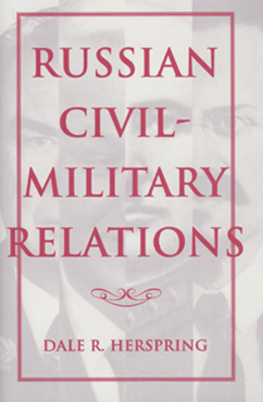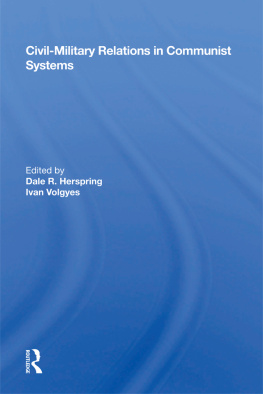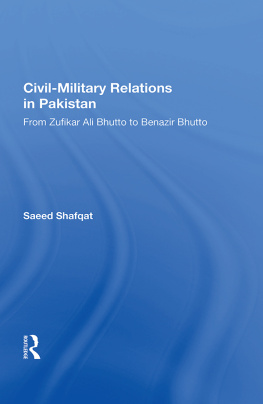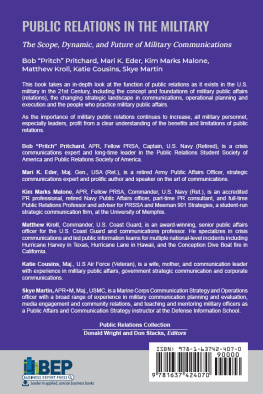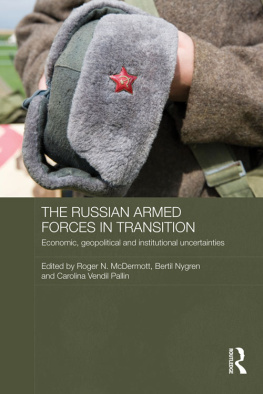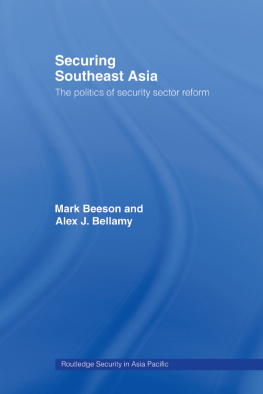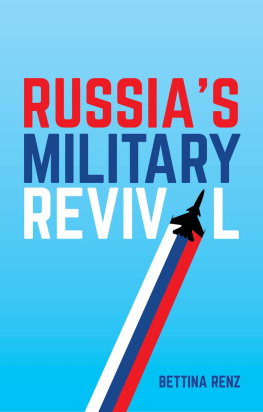RUSSIAN
CIVIL-MILITARY
RELATIONS
RUSSIAN
CIVIL-MILITARY
RELATIONS
DALE R. HERSPRING
INDIANA UNIVERSITY PRESS
Bloomington and Indianapolis
1996 by Dale R. Herspring
All rights reserved
No part of this book may be reproduced or utilized in any form or by any means, electronic or mechanical, including photocopying and recording, or by any information storage and retrieval system, without permission in writing from the publisher. The Association of American University Presses Resolution on Permissions constitutes the only exception to this prohibition.
The paper used in this publication meets the minimum requirements of American National Standard for Information SciencesPermanence of Paper for Printed Library Materials, ANSI Z39.481984.
Manufactured in the United States of America
Library of Congress Cataloging-in-Publication Data
Herspring, Dale R. (Dale Roy)
Russian civil-military relations / Dale R. Herspring
p. cm.
Includes bibliographical references and index.
ISBN 0253332257 (cl : alk. paper)
1. Civil-military relationsSoviet UnionHistory. 2. Civil-military relationsRussia (Federation)History. 3. Soviet UnionPolitics and government19171936. 4. Soviet UnionPolitics and government19851991. 5. Russia (Federation)Politics and government1991-I. Title.
UA770.H4797 1996
32250947dc20 9611635
1 2 3 4 5 01 00 99 98 97 96
To the Memory of My Father
Frank E. Herspring
One measure of a theory is the degree to which it encompasses and explains all the relevant facts.
Samuel Huntington
CONTENTS
Yeltsins resounding victory in the July 1996 elections, his precarious health, the unstable political situation in the country, and the emergence of General Lebedtogether with the resulting shake-up in the senior ranks of the Russian militarymake civil-military relations one of the most important and critical components of Russian politics today. The military is deeply split, demoralized, falling increasingly behind the West in the area of military technology and training, and highly politicized. With the appointment of General Lebed as national security advisor and the resultant increased attention being given to military reform, training, and modernization, however, there is a real possibility that the downward spiral the military has found itself in since the collapse of the Soviet Union may begin to be reversed. Organizational cohesion and combat readiness, which were at all-time lows in mid-1996, may slowly begin to improve. It will take time, but in five or ten years we may begin to see the emergence of a new Russian military that more closely resembles its Soviet predecessor in terms of its importance both as a combat-capable armed force and as a political interest group.
Given the political, economic, social, and moral instability in Russia today, together with the possibility that various parts of the civilian leadership will almost certainly continue their efforts to use the military for their own political ends, how this process develops is a matter of major concern. Indeed, I would argue that the way in which civil-military relations develop over the next five years is the most important issue in Russian politics today. Given the present deep divisions within the military, the chances of a military coup are almost zero. However, the emergence of a highly charismatic military figure such as Aleksandr Lebed could change things significantly. Heor someone like himcould provide the political influence and the spiritual cohesion needed to make the Russian military into a very important actor on both the internal and external political scenes.
In the past, Yeltsin tended to play off one military officer against another. For example, during the first half of 1996 he seemed to be courting simultaneously two senior military officersPavel Grachev, the defense minister, and Boris Gromov, the hero of Afghanistan and Grachevs bitter enemy. And then just prior to the second-round presidential run-off election, Yeltsin surprised everyone by appointing Lebed to a key position in the national security hierarchy. While at this writing (July 1996) it is too soon to say how long Lebed will remain a key actor in the Russian government, the fact that he has been given such a major portfolio suggests that even if he should be removed, his highlighting of the critical need to rebuild the military could make the process irreversible. In short, Yeltsinor his successormay discover that with a rebuilt army it is difficult to divide and conquer when dealing with senior officers. The organization may become too cohesive for such vulnerability to persist.
Before the military can become a unitary force, able to speak with something resembling one voice, much work remains to be done. As this book went to press, tensions were high throughout the armed forces. Russian generals openly clashed with each other over Moscows policies on a variety of issuesa situation that would have been unthinkable ten years ago. Even more alarming was the refusal of Russian generals to carry out some of Yeltsins orders. In the battle for Chechnya, for example, Russian generals repeatedly ignored cease-fires declared by Yeltsinanother development that would have been unthinkable ten years ago. One got the impression that the generals saw civil-military relations as a replay of the old Soviet joke, They pretend to pay us, and we pretend to work. Yeltsin pretended to issue orders and the generals pretended to obey them. In some cases, Russian officers even refused to carry out orders issued by their own military chain of command.
Conditions among the military rank and file were, if anything, even more demoralizing. Stories abounded of officers and soldiers going for three months and more without pay, and of wretched living conditions for personnel and their families. Tales circulated of pilots who could not fly for lack of fuel, tankers whose tanks could not operate because of a lack of spare parts, and sailors who starved to death at remote posts in the Pacific because they were not supplied with food. Meanwhile, junior officers, upon whom every army relies, were resigning in droves.
The war in Chechnya caused far more casualties than the Russian military was prepared to admit. Indeed, the militarys position in Chechnya was so desperate that the General Staff was forced to send to Chechnya units such as Russian marines who were trained for an entirely different task. Quite simply, there was no one else to send. The resulting deep dissatisfaction and frustration on the part of military personnel were one of the main reasons for widespread support within the military for nondemocratic presidential candidates.
One of the key problems facing Russian military and political leaders as they moved into the post-Soviet period was the lack of a model of civil-military relations to guide them. In economics and politics, Western observers urged the Russians to emulate Western democratic models. However, it quickly became apparent that outside models that did not fit with Russian political culture would not succeed. When it came to building a new basis for civil-military relations, factors such as historical precedent had to be taken into account. The Russian military was not born in a vacuum. It was part and parcel of Russian and Soviet culture and has been heavily shaped by its external environment.
With this in mind, this book asks the question: how useful is any model at the present time in trying to understand where Russian civil-military relations are headed? On the premise that political culture plays a key role in this area, this book looks at the Soviet period as well as the post-communist period. After all, it was clear from the statements of Russian military officers that the Ministry of Defense did not disown its Soviet past. Uniforms have changed only slightly. Although communist propaganda and the party-political apparatus were gone and there was a renewed search of the pre-communist military past for historical inspiration, the Russian military continued to resemble its Soviet predecessor when it came to such matters as military strategy, operational art and tactics, and attitudes toward subordinates and civilians, to mention only a few.

